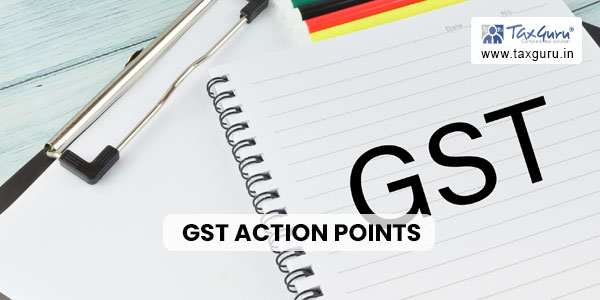The month of October 2023 is crucial for GST taxpayers for it is the last month to make corrections in respect of any inadvertent errors / genuine mistakes committed while filing the GST returns for FY 2022-23. Hence, it is important that taxpayers consider the following crucial action points before closing its books of accounts and filing GST returns for October 2023:
1. Outward supplies:
- Reconcile the outward supplies including other income as per books of accounts with GSTR-1 and GSTR-3B. The differences, if any, shall be accounted for in the books of accounts or considered in the GST returns, as the case maybe.
- Reconcile the fixed assets register with details disclosed in GST returns and account the differences accordingly in books or GST returns, as the case maybe.
- Reconcile the invoices as per books with e-invoice portal to ensure that IRN is generated for all the supplies for which e-invoicing is applicable (i.e., B2B, exports and SEZ supplies).
- In case of supply of goods, reconcile the e-way bill data with GST returns data and books of accounts. Movement of goods without valid e-way bills, even if it remains unidentified during the movement, may attract penalties during the departmental audit proceedings.
- Reconcile the debit and credit notes as per books with GSTR-1 and GSTR-3B and differences shall be adjusted accordingly.
- In case of export of goods, reconcile the shipping bills details with GSTR-1.
- In case of supply of services, reconciliation of advances received and adjusted as per books of accounts with that declared in GSTR-1 and GSTR-3B and GST payment on such advance receipt.
- Reconcile the NIL rated, exempt and non-GST supply turnover in books with disclosure in GST returns.
- Verify the HSN codes accounted in books are reconciling with the HSN summary reported in GSTR-1 of FY 2022-23. This will be helpful for GSTR-9 filing as well.
- October 2023 GSTR-1 is the last return to rectify any error in reporting of invoices, credit or debit notes done while filing returns for FY 2022-23.
- If any tax credit notes are required to be issued, October 2023 is the last month to issue such credit note and report in GST returns.

2. Inward supplies:
- Reconcile the ITC available and availed as per books of accounts with GSTR-2B and GSTR-3B.
- Communication to vendors for reporting of supplies not reflecting in the GSTR-2B of the Company.
- The differential ITC reflected in GSTR-2B but not availed and recorded in the books shall be accounted for in the books of accounts and availed in the GSTR-3B of October 2023.
- If there is any exempt income, ITC reversal shall be calculated and considered in the GSTR-3B in accordance with Rules 42 and 43 of the Central Goods and Service Rules, 2017 (‘CGST Rules’).
- Check whether the suppliers’ payment has been done within 180 days or not. If not done, then reverse the same along with interest and re-avail in the month of payment to the supplier.
- To ensure that all the ineligible ITC as per books has been disclosed in GSTR-3B. If any such ITC has been availed and utilized, same shall be reversed along with applicable interest.
- The ITC reversed during FY 2022-23 and pending for reclaim is identified and duly reported in opening balance of “Electronic credit reversal and reclaim statement”.
- Ensure that ITC for inputs and capital goods is identified and separately recorded in the books as per the requirement for GSTR-9 disclosure in Table 6.
3. RCM:
- To identify all the expenses from the books on which RCM is applicable (director sitting fees, legal expenses, security expenses, car hire charges, etc.) and reconcile the same with RCM liability discharged in GSTR-3B. The differential liability, if any, shall be discharged along with interest accordingly.
- Reconcile the foreign expenditure as per books of accounts with imports of services disclosed in the GST returns and RCM liability discharged.
- To ensure that self-invoices have been issued for all the supplies attracting RCM liability and received from unregistered persons.
4. GST payable / receivable balance:
- Reconcile the net GST receivable or payable as per books of accounts with the closing balance as per electronic credit ledger and cash ledger. The GST balance should consider the refund claim filed by the taxpayer, if any.
5. Additional points for consideration:
- To identify the common expenses incurred for related or distinct persons on which ITC has been availed and cross-charge the same to the respective entities on the basis of most rational and reasonable factors available (for example- in the ratio of turnover of such entities, etc.).
- To ensure that tax has been discharged under correct heads as per place of supply provisions.
- To run a comprehensive check on all suppliers to ensure their timely compliance with GST return deadlines. Any default should be promptly highlighted to avoid action from department on the taxpayer during audit proceedings as the recipient of supply.
******
Disclaimer: The above article is based on the author’s understanding and view of the tax laws, tax rules, the relevant circulars, and notifications. Please refer to the latest law and consult the author before forming any opinion based on the information provided above as tax laws are subject to frequent changes. The author is not responsible for any issues arising because of opinion based on the above article without consultation. In any manner whatsoever, the views expressed in this article should not be construed as the views of the firm that the author is associated with. The author can be contacted at gauravmittal756@gmail.com.






Sir,
As a Quarterly return filer, Can I amend Invoice relating to FY 22-23 in Decemebr’23 month due date is 13.01.24